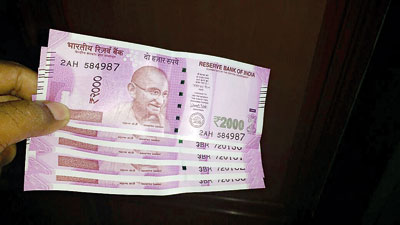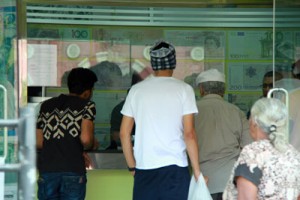News
Lankans holding high value Indian currency in a quandary
 The Government of India’s decision to demonetize Rs. 500 and Rs. 1000 currency notes has had its impact on Sri Lankans who hold currency.
The Government of India’s decision to demonetize Rs. 500 and Rs. 1000 currency notes has had its impact on Sri Lankans who hold currency.
The foreign money exchange counters in Sri Lanka have stopped accepting Indian currency for exchange, though the demonetized currency notes are valid till December 31.
“We don’t accept the demonetized Indian currency now and will only accept the newly introduced currency notes”, said spokesperson of International Exchange, a private foreign money exchange group.
In a suspense filled press statement on November 8, Indian Prime Minister Narendra Modi abolished the use of currency notes of Rs. 500 and Rs. 1,000 with immediate effect. However, he said that all notes in the lower denominations of Rs. 100, Rs. 50, Rs. 20 and Rs. 10 and all coins will continue to be valid. He also announced that new notes of Rs. 2,000 and Rs. 500 will be introduced and be available through banks from November 10.
Mr. Modi said that the measures were aimed at curbing the “disease” of black money and fake currency, which has taken deep root in the Indian economy.
Many Sri Lankans, who often travel to India have in their possession Indian currency, mainly in the higher denominations of Rs. 500 and Rs. 1,000. The Sri Lanka Money Brokers Association said that the majority of the foreign currency exchanges in Sri Lanka are operating on daily currency rates and they do not have a bank account in India to deposit, so that the money can be changed.
“Small scale foreign money exchanges, which account for almost 70 percent of foreign exchange business are operating by buying the currency today at an estimated price and selling it tomorrow considering the demand. So, for them it will be a loss if they buy the old Indian currency, as they can’t sell it in the future”, said an official associated with the Sri Lanka Money Brokers Association. Also the association members are doubtful when the new Indian currency will be available in the foreign exchange market. Even if the new currency notes are available in the country, the money exchanges are not ready to accept the old Indian currency.
“Established and large-scale money exchanges, which have the capability to transfer the Indian currency notes to banks in India, may accept the Indian currency, but institutions having such a well established network are relatively small in number,” the official said. Even Indian banks in Sri Lanka do not accept the demonetized currency notes and they do not provide the facility to deposit the currency in bank accounts back in India.
The Indian High Commission came up with an explanation that Sri Lankans in possession of demonetized Indian currency should look for their own way to exchange it. “Normally a person cannot carry more than Rs. 25,000 (Indian rupees) outside India. In case people have currency notes of Rs. 500 and Rs. 1,000 denomination with them, they will have to deposit the money once they are back in India. Else, they can send the money to relatives or friends and ask them to exchange them,” said Mr. Niteen working in the media wing of the Embassy.
It was also intimated that the distribution of new currency notes in India started on Thursday and it was only a matter of time the new currency notes would be available in Sri Lanka. The Exchange Control Department asserted that it is not responsible for the exchange of Indian currency inside Sri Lanka. “At present exchange of 14 currencies in Sri Lanka is monitored by the Central Bank and Indian currency is not listed in it. So, in actuality the money exchanges trading in Indian currency are illegal and also bringing in Indian currency to Sri Lanka is not allowed,” Controller of Exchange Mrs. T. M. J. Y. P. Fernando said.
The Exchange Control Department is certain that the demonetization won’t affect the Sri Lankan foreign exchange business, as it counts only a small portion of their business.
Problems for Indian currency hoarders, none for brokers  A money exchange centre in Colombo The demonetization of high denomination Indian currency has created problems for those who hold it, but it benefits some of the money exchange brokers in Sri Lanka. Though the majority of the foreign exchange counters have stopped accepting Indian currency, some exchanges are still accepting demonetized currency notes, at a very devalued rate. According to sources, on Saturday the actual selling rate of Indian currency was Rs 2.10 SLR. When some of the foreign exchange brokers were contacted, on the pretext of selling Indian currency, the offered rate ranged between Rs. 1 and Rs. 1.20 (Sri Lankan rupees). All these money exchanges have the facility to transfer the Indian currency to bank accounts in India, which means they are able to make extra profits. Some other money exchanges offered to accept Indian currency of lesser denomination such as the Rs. 100, Rs. 50 and Rs. 20 notes at their face value. |

